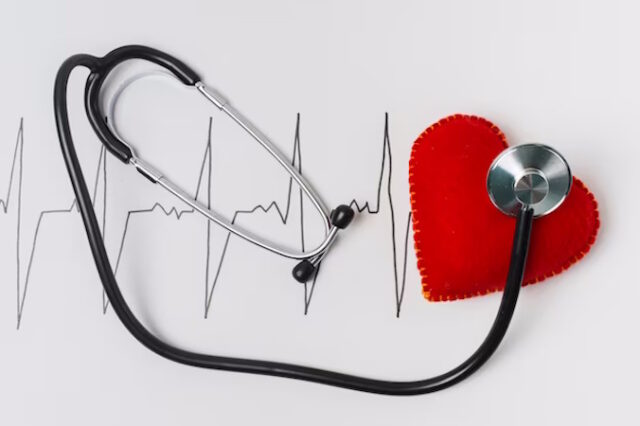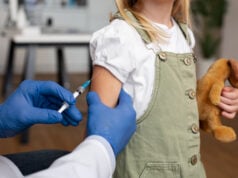
By Bob Curley — Fact checked by Jennifer Chesak, MSJ
Heart disease has been the leading cause of death in the United States for the past century.
More than half of Americans still don’t know it.
A new Harris Poll conducted for the American Heart Association reports that just 49% of adults in the United States correctly identified heart disease as the nation’s number one killer.
The poll, released alongside the annual statistical report, 2024 Heart Disease and Stroke Statistics: A Report of U.S. and Global Data From the American Heart Association, notes that 16% of respondents said they didn’t know the nation’s leading cause of death while 18% misidentified cancer as the top cause of mortality.
“Heart disease along with stroke, which is the fifth leading cause of death, claims more lives in the U.S. than all forms of cancer and chronic lower respiratory disease combined, based on the most recent data available,” said Dr. Joseph Wu, the president of the American Heart Association, director of the Stanford Cardiovascular Institute, and professor of medicine and radiology at the Stanford School of Medicine in California, in a press release. “So, the results of this survey, finding that most people do not know the significant impact of heart disease, is discouraging and even a bit frightening.”
The report noted that the lack of awareness of heart disease mortality contrasts with the fact that nearly half of all Americans have some form of cardiovascular disease, including coronary heart disease, heart failure, stroke, and high blood pressure.
Since 1950, death rates from cardiovascular disease have declined by 60% but have recently trended upward. Most of the deaths are attributed to high blood pressure. In the past decade, the age-adjusted death rate from high blood pressure increased by 65% percent, the report noted.
Yet 38% of people with high blood pressure were unaware that they had the condition.
“I cannot stress enough how important it is for people to fully recognize just how much cardiovascular diseases, including heart disease and stroke, impact each of us as individuals and communities,” said Wu. “If you don’t have heart disease yourself, chances are you know someone who does, perhaps a family member or other loved one.”
There are many reasons why the toll taken by heart disease is under-recognized, experts said.
“Misconceptions that heart disease is primarily a disease of older men and that it presents with classic symptoms leads to under-diagnosis and under-treatment,” Dr. Leann Poston, a health educator with Ohio-based Invigor Medical who wasn’t involved in the research, told Medical News Today. “People may not want to acknowledge heart disease as a leading cause of death because many risk factors for heart disease require lifestyle modifications that are hard to do, such as losing weight, stopping smoking, and consuming a heart-healthy diet.”
Dr. Bernadette Boden-Albala, the director and founding dean of the Program in Public Health at the University of California Irvine who was not involved in the research, told Medical News Today that misplaced skepticism also plays a role.
“Every day public health practitioners, often behind the scenes, are working on ways to keep people healthy,” she said. “Which is why it has been so disheartening to witness the attacks against the field of public health professionals, agencies, and advocates… The anti-science movement, with its roots in skepticism, misinformation, and sometimes complete ignorance, gained momentum during the pandemic with the anti-vaccine, anti-mask, and anti-public health influencers and protesters.”
Dr. Seth Martin, the chair of the statistical update writing committee on the 2024 American Heart Association report and a professor of medicine and cardiologist at Johns Hopkins School of Medicine in Maryland, said the fact that heart disease is a “silent killer” also hinders recognition of the toll it takes.
“Cancer gets a lot more attention while cardiovascular disease creeps up slowly over decades as plaque builds up on the arteries,” Martin told Medical News Today.
Experts say improved public health messaging could increase awareness of heart disease.
“We need someone like Taylor Swift to get the word out,” Martin suggested. “It needs to be presented in ways that are fun, like cooking healthy meals together with family, or getting involved in sports… There’s an opportunity to make it part of the culture.”
Martin did take a “glass half full” view of the statistical report, choosing to be encouraged that half of Americans are aware of the preeminent role heart disease plays in mortality.
“It’s humbling how much we still have to do, but I don’t look at it as a failure but as a call to action,” he said.
Martin and other experts said that recent increases in heart disease deaths may be attributable in part to the COVID-19 pandemic and lockdowns, which reduced access to both preventive care and treatment for heart disease and other illnesses.
Boden-Albaba added that, for some populations, lack of access to care is a chronic condition that contributes to disproportionate rates of heart disease and related deaths.
“Why is it that the prevalence of high blood pressure among Black people in the U.S. is among the highest in the world? Why do Latinx and Mexican American populations have a higher rate of obesity than the general population? Why are communities of color disproportionately impacted by these risk factors for heart disease?” she said. “Because social determinants of health have created these barriers and environments that impact these communities. Even if someone knows about the dangers of heart disease, without health insurance, a car to drive to the doctor’s office, support for child care, and flexible hours at work, how could they seek the help they need? The first step in preventing disease is always to spread awareness and knowledge, but it is only the first step in a long process to get care.”
Disclaimer
The information contained in South Florida Reporter is for general information purposes only.
The South Florida Reporter assumes no responsibility for errors or omissions in the contents of the Service.
In no event shall the South Florida Reporter be liable for any special, direct, indirect, consequential, or incidental damages or any damages whatsoever, whether in an action of contract, negligence or other tort, arising out of or in connection with the use of the Service or the contents of the Service. The Company reserves the right to make additions, deletions, or modifications to the contents of the Service at any time without prior notice.
The Company does not warrant that the Service is free of viruses or other harmful components
This article originally appeared here and was republished with permission.












